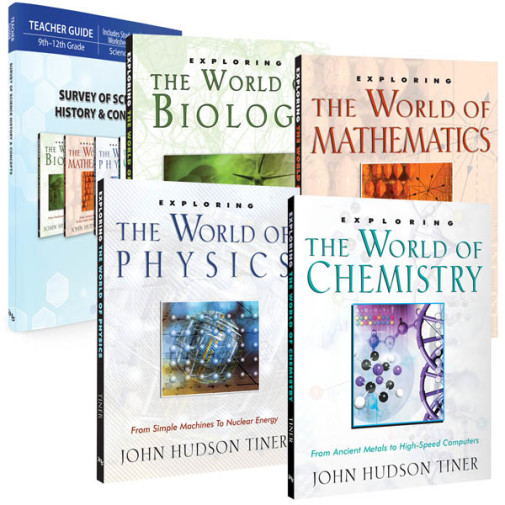We use cookies to make your experience better. To comply with the new e-Privacy directive, we need to ask for your consent to set the cookies. Learn more.
Survey of Science History and Concepts Package
Four titles from the best-selling Exploring Series are combined for a full year of study. Exploring the World of Mathematics focuses on mathematical history and insights, Exploring the World of Physics covers both historical discoveries and the latest advances, Exploring the World of Biology relates the amazing world of life God created, and Exploring the World of Chemistry teaches the basics of chemistry, as well as the accounts of powerful discoveries and discoverers throughout history. Combined with the Parent Lesson Plan, you will have a detailed calendar for each week of study, reproducible worksheets, quizzes and tests, and answers keys to help grade all assignments.
Survey of Science History & Concepts
Course Description
Students will study four areas of science: Scientific Mathematics, Physics, Biology, and Chemistry. Students will gain an appreciation for how each subject has affected our lives and for the people God revealed wisdom to as they sought to understand Creation. Each content area is thoroughly explored, giving students a good foundation in each discipline.
Semester 1: Math and Physics
Numbers surround us. Just try to make it through a day without using any. It's impossible: telephone numbers, calendars, volume settings, shoe sizes, speed limits, weights, street numbers, microwave timers, TV channels, and the list goes on and on. The many advancements and branches of mathematics were developed through the centuries as people encountered problems and relied upon math to solve them. It's amazing how ten simple digits can be used in an endless number of ways to benefit man. The development of these ten digits and their many uses is the fascinating story in Exploring the World of Mathematics.
Physics is a branch of science that many people consider to be too complicated to understand. John Hudson Tiner puts this myth to rest as he explains the fascinating world of physics in a way that students can comprehend. Did you know that a feather and a lump of lead will fall at the same rate in a vacuum? Learn about the history of physics from Aristotle to Galileo to Isaac Newton to the latest advances. Discover how the laws of motion and gravity affect everything from the normal activities of everyday life to launching rockets into space. Learn about the effects of inertia firsthand during fun and informative experiments. Exploring the World of Physics is a great tool for student who want to have a deeper understanding of the important and interesting ways that physics affects our lives.
Semester 2: Biology and Chemistry
The field of biology focuses on living things, from the smallest microscopic protozoa to the largest mammal. In this book you will read and explore the life of plants, insects, arachnids, aquatic life, reptiles, birds, and mammals, all highlighting God's amazing creation. You will learn about biological classification, how seeds spread around the world, long-term storage of energy, how biologists learned how the stomach digested food, the plant that gave George de Mestral the idea of Velcro, and so much more. For most of history, biologists used the visible appearance of plants or animals to classify them. They grouped plants or animals with similar-looking features into families. Starting in the 1990s, biologists have extracted DNA and RNA from cells as a guide to how plants or animals should be grouped. Like visual structures, these reveal the underlying design of creation. Exploring the World of Biology is a fascinating look at life " from the smallest proteins and spores to the complex life systems of humans and animals.
Chemistry is an amazing branch of science that affects us every day, yet few people realize it or even give it much thought. Without chemistry, there would be nothing made of plastic, and there would be no rubber tires, no tin cans, no televisions, no microwave ovens, and no wax paper. This book presents an exciting and intriguing tour through the realm of chemistry as each chapter unfolds with facts and stories about the discoveries of discoverers. Find out why pure gold is not used for jewelry or coins. Join Humphry Davy as he made many chemical discoveries, and learn how they shortened his life. See how people in the 1870s could jump over the top of the Washington Monument. Exploring the World of Chemistry brings science to life and is a wonderful learning tool with many illustrations and biographical information.
Following the suggested schedule in the planner for the Explore Series (180 lessons), students will complete the course in one year, but they only receive ½ credit if done at the high school level (with the exception of Survey of Science, which is one full credit).These are transitioning from Parent Lesson Planners to Teacher Guides.
| Product Format: | Other |
|---|---|
| Brand: | Master Book Publishers |
| Grades: | 10-12 |
| ISBN: | 9780890517642 |
| Length in Inches: | 10.875 |
| Width in Inches: | 8.375 |
| Height in Inches: | 2 |
| Weight in Pounds: | 5.05 |

